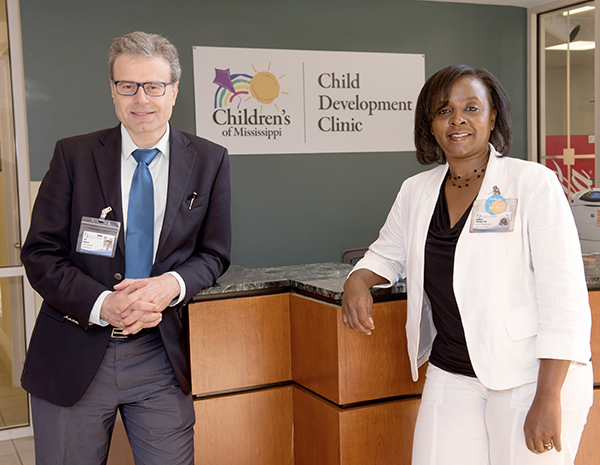
Are twitches and tics cause for concern? UMMC experts weigh in
Published on Tuesday, June 27, 2017
Published on June 27, 2017
A preschooler twitches his nose and shrugs his shoulders repetitively. An elementary school student brings a note home from her teacher about her persistent throat-clearing.
Are either of these cases a reason to see a specialist?
Maybe, say UMMC experts Dr. Tarif Bakdash, a pediatric neurologist, and Dr. Monica Sutton, a child psychologist. Bakdash and Sutton serve patients at the state's only clinic for Tourette syndrome at the University of Mississippi Medical Center's Center for the Advancement of Youth.
Sutton said if tics are impairing their children's daily functions, parents should seek treatment.
“They should seek treatment if their children are being bullied in school, are distracting others in the classroom or can't participate in activities, such as playing sports or going to church, because of their tics,” Sutton said.
The most common tic, called transient tic disorder, may affect up to 10 percent of children during their early school years, according to the American Academy of Child and Adolescent Psychiatry. Transient tics go away by themselves. Tics that last a year or longer are labeled “chronic” and affect less than 1 percent of children.
Children who have at least two motor tics and one vocal tic for at least one year are diagnosed with Tourette's. According to the National Institutes of Health, about 200,000 Americans have the most severe form of Tourette's, but as many as one out of 100 have milder symptoms. Often the tics become worse in Tourette's patients during times of anxiety or excitement and better during calm, focused activities.
Bakdash said tics are caused by a deficit in a brain circuit that connects deeper parts of the brain, basal ganglia and the thalamus to the front of the brain.
Persistent throat clearing, sudden movements or sounds, blinking or even shouting out words they don't intend to say can be a heavy weight for children with Tourette's and other tic-related disorders to bear. These behaviors can get them unwanted attention and stares in public and prove to be difficult to manage in the classroom.
Not coincidentally, Tourette's is often diagnosed when a child starts school at about 6, Sutton said.
“They often have trouble in school and have problems with their peers,” she said. “Sometimes they are made fun of by classmates or are punished for disruptions in class.”
“About 50 percent of children with Tourette's are bullied,” Bakdash said.
Sutton counsels patients and their families on how to deal with some of the collateral damage of Tourette's: wounded self-esteem from teasing by peers.
“By the time they get to me, they can feel defeated," Sutton said.
In general, managing tics requires the cooperation of a pediatric neurologist and a child psychologist, Bakdash said. He said most cases only need behavioral therapy.
Behavioral therapies, or Cognitive Behavioral Intervention for Tics, are taught in an eight-week program for patients and their families at the Children's of Mississippi Center for the Advancement of Youth. During weekly visits, patients learn to become aware of their tics, the cues that might trigger them and situations that might make their tics worse.
Parental involvement is key, Sutton said.
“We have to have the parents' buy-in,” she said. “They are the ones who will monitor the child and help implement the CBIT strategies. Parental involvement is critical for CBIT to work.”
Sutton said some patients also suffer from learning disorders or anxiety. Those conditions are treated first, so caregivers can focus better on CBIT strategies later on.
According to Bakdash, about a third of Tourette's patients outgrow their tics, and another third see improvement as they become adults.
“About 30 percent of patients continue to have Tourette's symptoms from childhood during their adult years,” he said.
“We don't want to give parents false hope,” Sutton said, “but in many cases, we see a significant decrease in tics, and as children grow up, some tics may go away. The reality is, though, that they can come back; but if they do, the patient will have the tools to control the tics again.”
For more information:
The clinic at the Center for the Advancement of Youth (CAY) at Select Specialty Hospital in Jackson takes place on Thursdays and offers care for Tourette's and comorbidities, including Obsessive-Compulsive Disorder, Attention Deficit Hyperactivity Disorder, mood disorders and non-OCD anxiety disorders. UMMC's appointment line is (888) 815-2005.


